|
|
|
Sort Order |
|
|
|
Items / Page
|
|
|
|
|
|
|
| Srl | Item |
| 1 |
ID:
180200
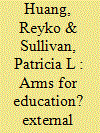

|
|
|
|
|
| Summary/Abstract |
How does foreign support for rebel groups affect rebel governance of civilians during armed conflict? Existing studies primarily examine the local and domestic politics of rebel rule, leaving the effects of foreign intervention on rebel governance underexplored. Focusing on rebel provision of social services, this study considers two competing arguments. The first suggests that foreign sponsorship reduces rebels’ need to rely on local civilians for resources and hence decreases rebels’ incentives to provide services. The second anticipates that by augmenting rebels’ resources and military capabilities, foreign support increases their capacity to provide welfare services. These competing logics suggest that different types of foreign support have divergent effects on rebel social service provision. The article tests this theory using cross-sectional time-series data on external support for rebel groups and rebel governance for the post-1945 period. It finds that rebel groups that receive external funding, weapons or training are significantly more likely to provide education and health services to civilians. In contrast, direct military intervention to assist insurgent forces has no effect on rebel service provision. This article is among the first to systematically study the impact of external support and third-party intervention on rebel social service provision during civil war and holds implications for civilian welfare in contested territories.
|
|
|
|
|
|
|
|
|
|
|
|
|
|
|
|
| 2 |
ID:
077441
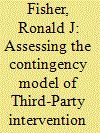

|
|
|
|
|
| Publication |
2007.
|
| Summary/Abstract |
The theory and practice of third-party intervention continue to develop in constructive directions and increasingly acknowledge the utility of unofficial methods directed more toward the subjective and relational aspects of international conflict. A previously developed contingency model of third-party intervention articulates the potential complementarity of these unofficial approaches (e.g. problem-solving workshops) with more traditional, official methods (e.g. power mediation) in pursuit of resolution. A comparative analysis of five cases of successful unofficial intervention in ethno-political conflicts identifies important contributions to the peace process. Descriptions of the interventions are followed by an identification of the transfer mechanisms and effects that carried the fruits of the unofficial interactions into the official domain. Each case is then reflected on the contingency model by identifying the stage of conflict escalation and the initiation, sequencing, and complementarity of interventions. The analysis provides some support for the validity of the model, although variations in the patterns of intervention indicate that strict applications of the model may be untenable. The model is thus seen as an idealized representation of a complex reality, but one that identifies some of the necessary interplay between official and unofficial interventions in order to effectively address intractable ethno-political conflicts.
|
|
|
|
|
|
|
|
|
|
|
|
|
|
|
|
| 3 |
ID:
192048
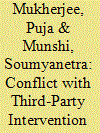

|
|
|
|
|
| Summary/Abstract |
Most real-world conflicts are characterised by the presence of third-party interventions as well as prolonged and revengeful violent interactions between the conflicting parties. However, most of the conflict literature studies the impact of each of these forces – third-party intervention and revenge motivations – on the conflict, in isolation from each other. This paper attempts to fill in this gap and aims to explore the impact of these two forces acting in conjunction with each other on a conflict situation. In fact, we also endogenise the intervention decision of the third party and explore parametric restrictions under which a third party decides to intervene (either as an ally of one of the conflicting parties or as an ‘idealist’ aiming to reduce overall conflict levels) and its repercussions on associated conflict levels. We also present narrative evidences of some real-life conflicts that amply exhibit the two forces of third-party intervention and revenge.
Peace is the only battle worth waging. – Albert Camus
|
|
|
|
|
|
|
|
|
|
|
|
|
|
|
|
| 4 |
ID:
185251
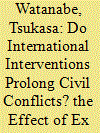

|
|
|
|
|
| Summary/Abstract |
Many studies have found that third-party intervention tends to prolong the duration of civil conflict. However, some studies have suggested that mere expectations of external intervention can prolong conflict duration even in the absence of actual intervention. Therefore, the effects of external interventions in prolonging the duration of civil conflicts remain unclear. This study examines the direct effect of third-party intervention on the duration of civil conflict by controlling for the indirect effect of expectations of external intervention. The probabilities of intervention were estimated, and the direct effect of interventions was tested by controlling for the effect of ex ante expectations. The empirical findings were as follows: (1) Third-party intervention has no direct effect of prolonging the duration of a conflict when expectations are controlled for, and (2) Third-party intervention may have an indirect effect of shortening conflict duration, which contradicts the findings of previous studies.
|
|
|
|
|
|
|
|
|
|
|
|
|
|
|
|
| 5 |
ID:
073783
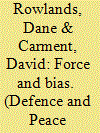

|
|
|
|
|
| Publication |
2006.
|
| Summary/Abstract |
Throughout the 1990s multilateral interventions often deviated significantly from traditional peacekeeping in terms of mandate complexity, level of force, and the absence of consent and impartiality. This paper develops a formal model of biased intervention and specifies propositions regarding its effects on combatant behaviour. We find that the response to the intervener depends on the how the combatants divide their labour resources between production and fighting, the amount of resources the intervener transfers between the combatants, and the degree to which the intervener's military efforts affect the effectiveness of the combatant's military forces. NATO's intervention in Kosovo is then used as a case study to illustrate the strengths and weaknesses of the model. Finally, we identify the theoretical and policy?relevant implications of the model and outline directions for future research.
|
|
|
|
|
|
|
|
|
|
|
|
|
|
|
|
| 6 |
ID:
148323
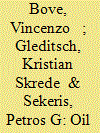

|
|
|
|
|
| Summary/Abstract |
We explore economic incentives for third parties to intervene in ongoing internal wars. We develop a three-party model of the decision to intervene in conflict that highlights the role of the economic benefits accruing from the intervention and the potential costs. We present novel empirical results on the role of oil in motivating third-party military intervention. We find that the likelihood of a third-party intervention increases when (a) the country at war has large reserves of oil, (b) the relative competition in the sector is limited, and (c) the potential intervener has a higher demand for oil.
|
|
|
|
|
|
|
|
|
|
|
|
|
|
|
|
| 7 |
ID:
089496
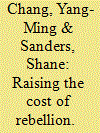

|
|
|
|
|
| Publication |
2009.
|
| Summary/Abstract |
This paper presents a simple model to characterize explicitly the role that an intervening third party plays in raising the cost of rebellion in an intrastate conflict. Extending the Gershenson-Grossman (2000) framework of conflict in a two-stage game to the case involving outside intervention in a three-stage game as in Chang et al. (2007b), we examine the conditions under which an outside party optimally intervenes such that (i) the strength of the rebel group is diminished or (ii) the rebellion is deterred altogether. We also find conditions in which a third party optimally intervenes but at a level insufficient to deter rebellion. Such behavior, which improves the incumbent government's potential to succeed in conflict, is overlooked in some conflict studies evaluating the effectiveness of intervention. One policy implication of the model is that an increase in the strength of inter-governmental trade partnerships increases the likelihood that third-party intervention deters rebellion.
|
|
|
|
|
|
|
|
|
|
|
|
|
|
|
|
| 8 |
ID:
167191
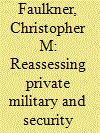

|
|
|
|
|
| Summary/Abstract |
This paper challenges recent claims that competitive market dynamics incentivize Private Military and Security Companies (PMSCs) to fully commit to providing effective services, thereby reducing the duration of civil war. Our assessment of a most-likely case scenario for this argument – Sierra Leone – reveals four critical problems. First, there is rarely direct competition, even if numerous companies are present. Second, the presence of multiple PMSCs usually represents a collaboration among subsidiaries providing distinct services, often under the same corporate umbrella. Third, data aggregation obfuscates the overlap of PMSC presence, inflating the amount of perceived competition. Finally, we raise concerns regarding how quantitative analyses can conflate conflict intensity with conflict termination.
|
|
|
|
|
|
|
|
|
|
|
|
|
|
|
|
| 9 |
ID:
190988
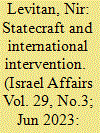

|
|
|
|
|
| Summary/Abstract |
The nature of the relationship between statecraft and third-party interventions is complex and remains an issue that has not been fully explored in the academic literature. Experience shows that the two often interact, at times creating harmonious coordination, at times exacerbating tensions. These actions and reactions were present for Israel after the War of Independence as it worked to form an effective approach to the UN and its peacekeeping forces that were created to supervise implementation of the 1949 Arab-Israeli armistice agreements. This article examines how Israel strove to develop its own foreign policy statecraft strategies and to protect its national and strategic interests in the early 1960s, while contending with the involvement of UNTSO under the activist leadership of Swedish Maj. Gen. Carl Von Horn.
|
|
|
|
|
|
|
|
|
|
|
|
|
|
|
|
| 10 |
ID:
091614


|
|
|
|
|
| Publication |
2009.
|
| Summary/Abstract |
Why do targets sometimes make concessions when third parties offer assistance? Both the extended deterrence and alliance literatures point to unreliable third parties to explain deterrence failure and target acquiescence. On the other hand, the alliance literature also suggests that third parties present a moral-hazard situation in which targets will behave less prudently when they have outside support. Without dismissing the importance of these dynamics, I demonstrate that targets will still make concessions when intervention is certain, and that interveners do not always embolden targets in crisis situations. Counterintuitively, interveners alter the bargaining situation, shifting the bargaining space so that conceding is more attractive than war for the target state. Instead of emboldening targets, third parties deter larger demands and produce settlement outcomes that reduce the burden on the target.
|
|
|
|
|
|
|
|
|
|
|
|
|
|
|
|
| 11 |
ID:
082411


|
|
|
|
|
| Publication |
2008.
|
| Summary/Abstract |
What effect do third parties have on the evolution of civil wars? The authors argue that intervention by third parties is central to the civil war process, a process that is characterized by the duration of hostilities and the type of outcome. The authors examine empirically the effect of third-party intervention into civil wars during the period 1816-1997, using the event history framework of competing risks. From the perspective of competing risks, as a civil war endures, it is at risk of experiencing a transition to one of three civil war outcomes in our sample: military victory by the government, military victory by the opposition group, and negotiated settlement. The competing risks approach provides considerably better leverage on the dynamic qualities of civil wars and, in particular, the influence of interventions by third parties. The analysis suggests that third-party interventions can be decisive in the evolution of civil wars and that third-party interventions have a different effect on the duration than different civil war outcomes. The results show that third-party intervention decreases the time until the supported group achieves military victory. Furthermore, third-party interventions, on both the government and opposition sides, increase the time until a negotiated settlement
|
|
|
|
|
|
|
|
|
|
|
|
|
|
|
|
| 12 |
ID:
152121
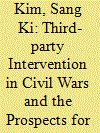

|
|
|
|
|
| Summary/Abstract |
How does third-party intervention in civil war influence citizens’ physical quality of life (QOL) after civil war? I find that the effects of intervention on postwar QOL depend on its type, unilateral intervention, and United Nations (UN) intervention. Unilateral interveners seeking self-interest tend to impede the improvement in postwar QOL particularly in terms of life expectancy and infant mortality rate. They are likely to do so through producing their protégé’s military victory or negotiated settlement, expanding their influence on postwar government, and resultingly forming a government less responsive to citizens’ hardship and reducing resources available for welfare. UN intervention on humanitarian grounds tends to promote postwar social development particularly in the fields of public health, although it has no significant effect on literacy rate. It is likely to do so by increasing resources available for postwar reconstruction, even though it goes where postwar social development is relatively difficult.
|
|
|
|
|
|
|
|
|
|
|
|
|
|
|
|
| 13 |
ID:
157828
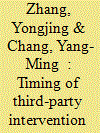

|
|
|
|
|
| Summary/Abstract |
This paper analyzes how the equilibrium outcome of social conflict between factions is strategically altered by third-party intervention. We consider an intervening third party that commits financial support to one of two contending factions for reducing its cost in conflict. Within the framework of three-player sequential-move games, we investigate the questions as follows. What is the optimal intervention intensity in terms of the third party’s financial support? Is there a first-mover advantage in conflict when there is third-party intervention? Fighting against all odds, will the unsupported faction have a chance to prevail when its opponent receives third-party support? What is the optimal timing of third-party intervention? The analysis in the paper has implications for the conditions under which the strategic intervention of a third party may or may not break a conflict between factions.
|
|
|
|
|
|
|
|
|
|
|
|
|
|
|
|
|
|
|
|
|